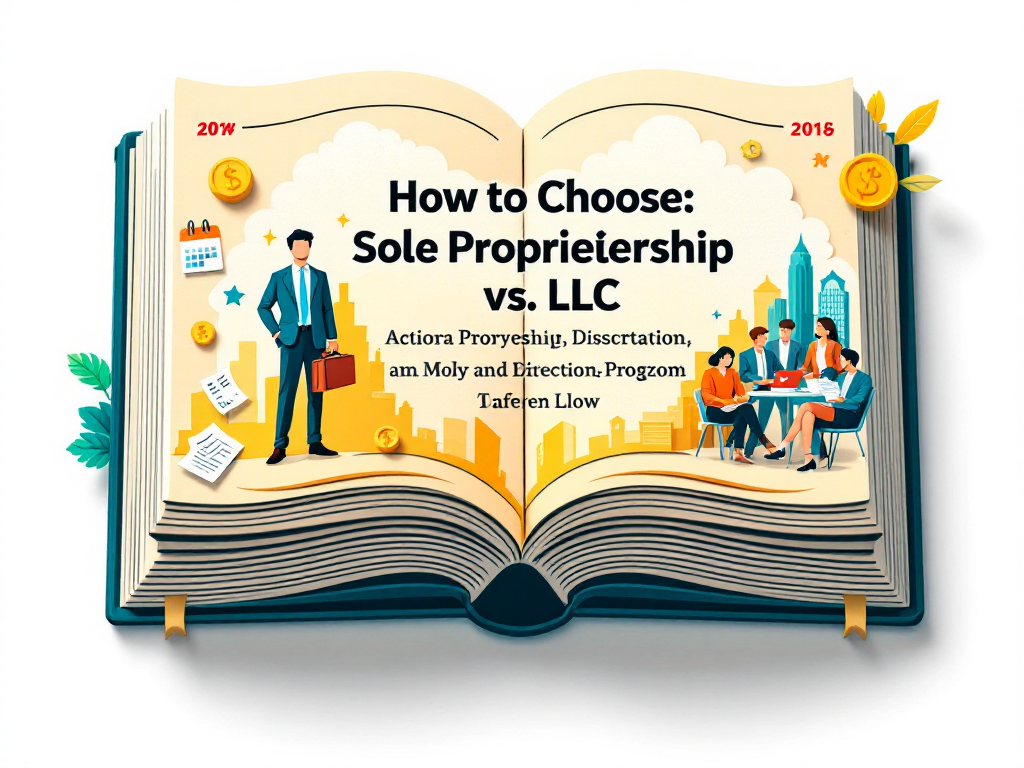Introduction: Business Owners Get to Choose
Imagine Sarah, a budding entrepreneur with an innovative concept for a sustainable fashion brand. Before launching her business, she has to make an important decision – should she operate as a sole proprietorship or as an LLC? Her selection of a business structure would determine financial liability, tax obligations and future growth potential of her brand. This one choice isn’t simply regarding the lawful procedures; it has to do with establishing the best course for success. That is what makes PayInOne such a vital resource, providing guidance and support in navigating these important business decisions.
Sole Proprietorship Explained
Definition
A sole proprietorship is the most basic type of business ownership. By definition, it is a sole proprietorship, one-man business with no distinction whatsoever between the human being and the entity that carries out the business.
Advantages
- Ease : A sole proprietorship is easy to set up. It has fewer legal formalities than other forms of business;
- Low Cost: It takes less capital to set up, less administration cost and also lower filing fees.
- Direct Control: The owner has complete command of all processes, enabling in-the-now decisions.
Disadvantages
- Owner Personal Liability: owner is liable for all debts and obligations, exposing personal assets to risk.
- Limited Potential for Growth: Striking a successful deal can be challenging when seeking to raise capital because investors may prefer to deal with more advanced structures such as LLCs or corporations.
Delving into LLCs (Limited Liability Companies)
Definition
A Limited Liability Company (LLC) is a hybrid business entity that has the limited liability features of a corporation and the tax efficiencies and operational flexibility of a partnership.
Advantages
- Limited Liability: Members are shielded from personal responsibility for business debts and claims.
- Flexibility: LLCs have flexible management structures and profit distribution options.
- Credibility: An LLC is widely considered more credible and stable which makes it more appealing to investors and business partners.
Disadvantages
- Complexity: An LLC has more paperwork and compliance requirements than a sole proprietorship.
- Higher Costs: Startup and periodic compliance costs can be higher than a sole proprietorship.
- Taxes: Additional taxes may apply to LLCs depending on the state, such as a franchise tax or annual report fee.
Major Differences: Sole Proprietorship vs. LLC
Tax consequences also vary greatly. Sole proprietors report their business income on their personal tax returns, while LLCs have options on how they are taxed — as a sole proprietor, a partnership, or a corporation. This can also potentially save some taxes through this flexibility, but it needs a careful and proper planning.
Industry Best Practices & Insights
What the Experts Say
“The right business structure is important, it helps protect personal assets and optimize tax benefits. An LLC is usually a good choice for those who want a balance of liability protection and operational flexibility.” — A Business Consultant
Pitfalls to Avoid
- Not Discerning Risk: If you don’t chart your personal risk you could go broke. If your organization carries considerable risk, an LLC is a great option.
- You ignore tax implications: Each of these structures has different tax consequences. Seek advice from a tax professional to avoid unwelcome surprises.
- Ignoring costs: When selecting a structure, consider both start-up costs and ongoing administrative costs.
One way easily can help entrepreneurs cope with dealing with these challenges is by providing them with resources and tools to help set up and manage their selected business structure.
Real-World Examples
Take the example of a tech startup that started life as a sole proprietorship. For starters, it took off because this structure enabled simplicity and low cost. But when the business scaled and started getting international clients, the owner took on more liability risks. The startup also was able to safeguard personal assets and bolster credibility with potential investors by becoming an LLC.
One such example would be the owner of a small boutique who opted to stay as a sole proprietor. Using PayInOne’s tools, she successfully handled international transactions seamlessly, allowing her business to remain as simple as possible whilst going global.
The Future of Business Structures: What to Expect
Moving forward, new business structures trends are shaped by technology and new regulations: Blockchain technologies and digital coins are changing the way businesses around the world conduct their business. Only those companies that adjust themselves to these changes will be able to stay competitive in cross-border transactions.
Moreover, newly enacted regulations could affect how LLCs are established and run, reinforcing the need for being aware and adaptable. Entrepreneurs must adapt to these changes, and leveraging a platform like PayInOne can help you stay agile and compliant.
Conclusion & Call to Action
To wrap it up, llama or llc business structure will surely matter to any entrepreneur. Each structure has its own pros and cons, and will impact liability, taxes and growth potential. You must weigh these factors carefully and align with your business goals.

We encourage you to assess your business needs and explore how PayInOne can fuel your journey. From handling cross-border payments to venturing into new markets, PayInOne empowers you with the tools and insights for success.
Want to streamline your global operations and address business structure decisions head-on? Learn how PayInOne can help you — https://payin.one/.
